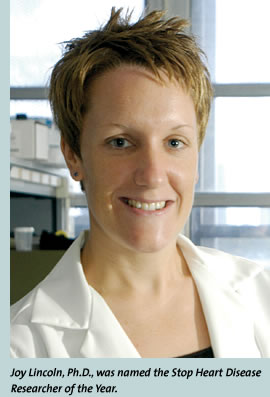Joy Lincoln Wins Prestigious Cardiology Research Award
![]() year
ago when Joy Lincoln, Ph.D., was looking for the best place to continue
the important embryonic heart development research she was doing to help
cure heart disease, she chose the Miller School of Medicine.
year
ago when Joy Lincoln, Ph.D., was looking for the best place to continue
the important embryonic heart development research she was doing to help
cure heart disease, she chose the Miller School of Medicine.
 Lincoln, assistant professor of molecular and cellular pharmacology,
researches how heart valves form, what genes regulate normal heart
development, and whether these genes are important or involved
in heart valve disease.
Since 2004, she has been lead author on six papers published on the
subject. At Miller since November 2006, she has already won two
heart-related
research grants.
Lincoln, assistant professor of molecular and cellular pharmacology,
researches how heart valves form, what genes regulate normal heart
development, and whether these genes are important or involved
in heart valve disease.
Since 2004, she has been lead author on six papers published on the
subject. At Miller since November 2006, she has already won two
heart-related
research grants.
Lincoln’s accomplishments were recently recognized by the Florida Heart Research Institute when it named her its fifth Stop Heart Disease Researcher of the Year. Taking a break from her valuable work, she picked up the award at an October 27 event during the annual meeting of the Florida Chapter of the American College of Cardiology in Kissimmee.
“I was surprised that I was even nominated since this is my first faculty appointment,” says Lincoln. “But I feel quite privileged to have been recognized for doing work that is so important in the fight against heart disease.”
Lincoln was nominated by James D. Potter, Ph.D., FAHA, professor and chairman of the Department of Molecular and Cellular Pharmacology. “The department is very excited about Dr. Joy Lincoln, one of our newest arrivals who is studying the normal mechanisms that govern heart valve development with the intent of determining what goes wrong in valve disease, a major health problem in the U.S.,” Potter says.
He adds, “She is one of a handful of investigators working in this area and has a very exciting and unique approach to studying these very important questions.”
Born in Britain, Lincoln earned graduate and undergraduate degrees from the University of Durham. She concentrated on stem cells for her Ph.D. but switched to heart development for her post-doctoral training at Cincinnati Children’s Hospital.
At the award ceremony, Lincoln’s work was described as outstanding
and groundbreaking in both the clinical and basic science arenas. Lincoln
says such “bench-to-bedside” cooperation is given a high
priority at UM. “Cardiovascular disease is having a huge impact,
and I’m here at the right time to feed into an established network
and become part of this community,” Lincoln says. “UM has
great resources and mentors, and it’s an exciting place to be right
now.”